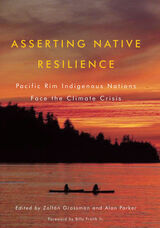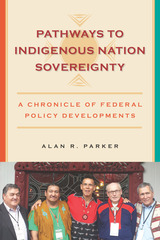5 books by Parker, Alan

The Age of Discovery
Alan Michael Parker
Tupelo Press, 2020
Alan Michael Parker’s latest collection, The Age of Discovery, is a work of enduring beauty, filled with his signature tenderness and surprise. Parker’s interests range from the Psalms to the Internet, from a woman stepping out her window to die to two men trying to learn how to live as they argue in a row-boat. With an eye on some of the greatest love poets (Amichai, Mistral, Neruda), Parker delivers a collection deep in empathy, rigorously attentive, and formally inventive.
[more]

Asserting Native Resilience
Pacific Rim Indigenous Nations Face the Climate Crisis
Edited by Zoltán Grossman and Alan Parker
Oregon State University Press, 2012
Indigenous nations are on the front line of the climate crisis. With cultures and economies among the most vulnerable to climate-related catastrophes, Native peoples are developing twenty-first century responses to climate change that serve as a model for Natives and non-Native communities alike.
Native American tribes in the Pacific Northwest and Indigenous peoples around the Pacific Rim have already been deeply affected by droughts, flooding, reduced glaciers and snowmelts, seasonal shifts in winds and storms, and the northward movement of species on the land and in the ocean. Using tools of resilience, Native peoples are creating defenses to strengthen their communities, mitigate losses, and adapt where possible.
Asserting Native Resilience presents a rich variety of perspectives on Indigenous responses to the climate crisis, reflecting the voices of more than twenty contributors, including tribal leaders, scientists, scholars, and activists from the Pacific Northwest, British Columbia, Alaska, and Aotearoa / New Zealand, and beyond. Also included is a resource directory of Indigenous governments, NGOs, and communities and a community organizing booklet for use by Northwest tribes.
Native American tribes in the Pacific Northwest and Indigenous peoples around the Pacific Rim have already been deeply affected by droughts, flooding, reduced glaciers and snowmelts, seasonal shifts in winds and storms, and the northward movement of species on the land and in the ocean. Using tools of resilience, Native peoples are creating defenses to strengthen their communities, mitigate losses, and adapt where possible.
Asserting Native Resilience presents a rich variety of perspectives on Indigenous responses to the climate crisis, reflecting the voices of more than twenty contributors, including tribal leaders, scientists, scholars, and activists from the Pacific Northwest, British Columbia, Alaska, and Aotearoa / New Zealand, and beyond. Also included is a resource directory of Indigenous governments, NGOs, and communities and a community organizing booklet for use by Northwest tribes.
[more]

The Ladder
Poems
Alan Michael Parker
Tupelo Press, 2016
Whether about the moon or hotel sex, politics or poppy seeds, Alan Michael Parker’s poems are always tender and eccentric and nuanced. In his eighth collection, with metaphysical fortitude the poet continues to deliberate—in all sorts of poems, some unpunctuated, some in prose, and some the first-person lyrics well loved by his longtime readers—upon what our daily lives mean. And how do we sing and praise and grieve all at once?
[more]

Long Division
Alan Michael Parker
Tupelo Press, 2012
In his seventh poetry collection, Alan Michael Parker aims to surprise. Recombining lists, fables, and mathematical equations, Long Division is formally playful, wielding irony as a lever of political resistance. Here is a writer fascinated by comedy, by sadness, and by the unexpected ways that poetry makes both possible at once. When was the last time you laughed out loud reading poems? Parker’s new work is truly funny, exposing the impossibility of realism in a world where imagination is more trustworthy than experience.
[more]

Pathways to Indigenous Nation Sovereignty
A Chronicle of Federal Policy Developments
Alan R Parker
Michigan State University Press, 2018
In a story that could only be told by someone who was an insider, this book reveals the background behind major legislative achievements of U.S. Tribal Nations leaders in the 1970s and beyond. American Indian attorney and proud Chippewa Cree Nation citizen Alan R. Parker gives insight into the design and development of the public policy initiatives that led to major changes in the U.S. government’s relationships with Tribal Nations. Here he relates the history of the federal government’s attempts, beginning in 1953 and lasting through 1965, to “terminate” its obligations to tribes that had been written into over 370 Indian treaties in the nineteenth century. When Indian leaders gathered in Chicago in 1961, they developed a common strategy in response to termination that led to a new era of “Indian Self-Determination, not Termination,” as promised by President Nixon in his 1970 message to Congress. Congressional leaders took up Nixon’s challenge and created a new Committee on Indian Affairs. Parker was hired as Chief Counsel to the committee, where he began his work by designing legislation to stop the theft of Indian children from their communities and writing laws to settle long-standing Indian water and land claims based on principles of informed consent to negotiated agreements. A decade later, Parker was called back to the senate to work as staff director to the Committee on Indian Affairs, taking up legislation designed by tribal leaders to wrest control from the Bureau of Indian Affairs over governance on the nation’s 250 Indian reservations and negotiating agreements between the tribes that led to the Indian Gaming Regulatory Act. A valuable educational tool, this text weaves together the ideas and goals of many different American Indian leaders from different tribes and professional backgrounds, and shows how those ideas worked to become the law of the land and transform Indian Country.
[more]
READERS
Browse our collection.
PUBLISHERS
See BiblioVault's publisher services.
STUDENT SERVICES
Files for college accessibility offices.
UChicago Accessibility Resources
home | accessibility | search | about | contact us
BiblioVault ® 2001 - 2024
The University of Chicago Press









